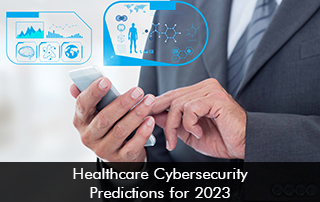In the year 2023, healthcare organizations will continue to combat ransomware attacks. With the digital ecosystem enlarging, health systems will be exposed to new threats. There are immense benefits of shifting to electronic records and ditching traditional paper methods, however, organizations need to be careful and have a tight cybersecurity protocol to ensure the protection of sensitive patient health information and other important data stored and exchanged digitally.
What industry leaders are saying about cybersecurity this year?
Many industry leaders have shared their thoughts on cybersecurity and privacy predictions for 2023. To maintain patient privacy, organizations must enhance existing security practices to diminish the chances of an attack happening.
Positive regulatory updates and the effects of the COVID-19 pandemic will be the silver lining in the sky as practices are willing to focus on adapting proactive strategies to remain strong in uncertain times.
Ransomware attacks will continue
In 2023 ransomware attacks will remain to impact the healthcare sector. This year ransomware will evolve which means healthcare organizations need to be prepared to enhance their defenses to ensure patient privacy around the clock. Ransomware attacks are most common in the healthcare sector and organizations can’t afford to lose crucial patient information.
Ransomware attacks are expected to cause disruptions and destruction. Organizations must do everything to protect data and apps. By focusing on resiliency and business continuity, healthcare organizations can recover quickly from data breaches and ransomware attacks without compromising patient safety. Security resilience will be critical in 2023. Security resilience allows organizations to focus their security resources on areas that offer the greatest value and ensure that it is protected.
There will also be a greater focus on data recovery and backup as ransomware attacks will continue to disrupt smooth running operations.
Regulatory changes
Guidance and regulations from the OCR and other federal units will become important in 2023 to help guide the healthcare sector through swift technological advancements while balancing HIPAA-compliance requirements.
The healthcare organizations which ran away from HIPAA will decide to embrace it as there will be a greater focus on state privacy regulation.
Remote care is here to stay with security implications
The COVID-19 pandemic accelerated the adoption of remote care, making healthcare possible anywhere. This enabled remote access to medical devices and remote connectivity with healthcare providers, nurses, and pharmacies. Telemedicine usage increased during the pandemic and is still going strong. This means healthcare organizations need to consider new security and privacy risks with remote care solutions. As telehealth is on the rise, the importance of network security to protect Electronic Medical Records (EMR) Software data should be the prime attention.
Advancements in security solutions
As cyber threats evolve, there have been advancements in security solutions and analytics. Artificial Intelligence technology, machine learning, and other tools can support health systems to enhance and tweak their security processes. Fortunately, the healthcare sector is learning to collaborate and communicate effectively to navigate through these challenges.







